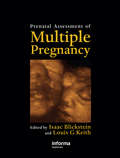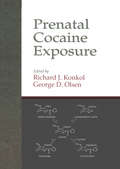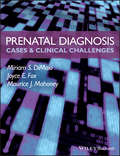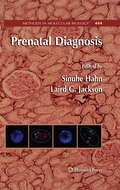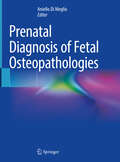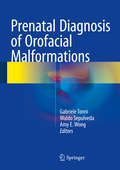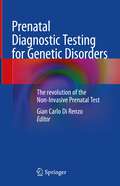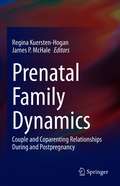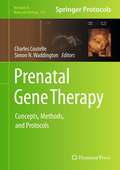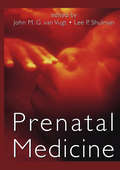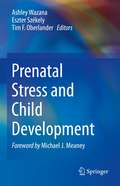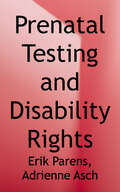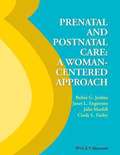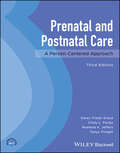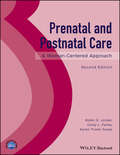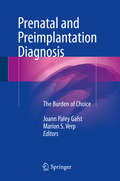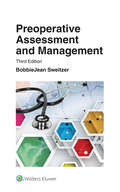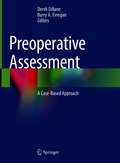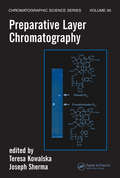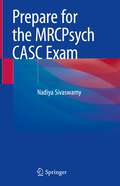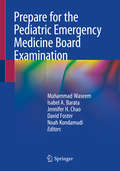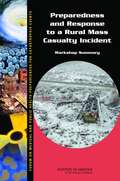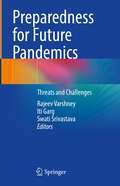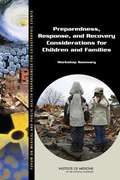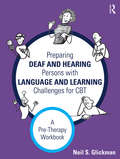- Table View
- List View
Prenatal Assessment of Multiple Pregnancy
by Isaac Blickstein Louis G KeithFollowing on from the success of their previous standard textbook on Multiple Pregnancy, the authors have refocused their attention on prenatal assessment in multiple pregnancy and come up with condensed and revised material in a free-standing text. Multiple pregnancies are associated with higher levels of morbidity and fetal distress, and so effective and rapid diagnosis of problems is paramount. Those clinicians who would not have a practical application for all the aspects covered comprehensively in the earlier work will find this volume a clinically orientated and extremely useful addition to their working library.
Prenatal Cocaine Exposure
by Richard J. Konkol George D. OlsenPrenatal Cocaine Exposures addresses the timely problem of maternal cocaine abuse and its effects on exposed infants, including growth retardation, learning, cardiovascular effects, and seizures. The impact of substance abuse on this and future generations presents an ongoing challenge to medical science. This comprehensive and authoritative volume reviews both animal and clinical studies to explain implications for treatment and long-term outcomes of early exposure.Prenatal Cocaine Exposures investigates the specific role of cocaine in altering fetal development. Discussions of current studies and state-of-the-art techniques provide a basis for informed clinical decisions. Pediatricians, medical specialists, basic scientists, educators, and policy makers will all benefit from the comprehensive research gathered in this volume.
Prenatal Diagnosis
by Joyce E. Fox Miriam S. Dimaio Maurice J. MahoneyHow can prenatal testing help your patients?In utero diagnosis has undergone an amazing revolution in recent years. More tests are available; the indications for prenatal diagnosis have expanded - you can now advise your patients about disorders you could not have previously detected. Medical training for obstetricians, medical geneticists, and genetic counselors has not kept pace with these developments. Clinical exposure to common and unusual problems in prenatal diagnosis is limited.Prenatal Diagnosis: Clinical Cases and Challenges, based on the authors' several decades of experiences, fills this gap. Real cases portray diagnostic problems as a route to the underlying biology, the available testing options, and the results that might be obtained. The authors discuss the challenges of management, interpretation, and counseling.Cases used throughout emphasize three types of clinical problems:Chromosomal abnormalitiesMendelian disordersFetal structural abnormalitiesThe decision to enter the world of prenatal diagnosis should be very carefully considered by any prospective mother. Prenatal Diagnosis: Clinical Cases and Challenges will help you discuss the issues in an informed manner with your patients.
Prenatal Diagnosis
by Sinuhe Hahn Laird G. JacksonIn this thorough and state-of-the-art book, top experts provide cutting edge techniques which greatly expand the depth and scope of classical invasive prenatal diagnosis. The book features a totally unique focus on novel non-invasive approaches for prenatal diagnosis. Following the Methods in Molecular BiologyTM series format, the chapters feature step-by-step laboratory protocols, lists of the necessary materials, and tips on troubleshooting and avoiding known pitfalls.
Prenatal Diagnosis of Fetal Osteopathologies
by Aniello Di MeglioThe main aim of this book is to help obstetricians and gynecologists recognize prenatal skeletal anomalies. Bone dysplasias alone represent about a third of all fetal malformations, some of which have different prognoses ranging from mild disabilities to severe or lethal ones. However, recognizing them prenatally is often difficult or impossible as they usually become apparent in the third trimester or even after birth. The majority of skeletal syndromes are extremely rare, making genetic testing necessary. The book is divided into sections, starting from the skull and ending with the feet, with each chapter discussing anomalies specific to that organ or bone deformation. It's a lengthy journey of 56 chapters that requires a precise and rigorous educational path to diagnose such diseases. However, by following the "Ariadne's thread" represented by the "characteristic sign" and the help of a geneticist, the difficult task becomes feasible.
Prenatal Diagnosis of Orofacial Malformations
by Gabriele Tonni Waldo Sepulveda Amy E. WongThis book describes how different diagnostic techniques may facilitate the prenatal identification of orofacial malformations. The role of standard two-dimensional ultrasound is documented and explained, but detailed attention is also paid to the use of three-dimensional (3D) ultrasound, including the novel 3D reslicing technique, and to the value of complementary magnetic resonance imaging. The malformations considered include cleft lip, cleft lip and palate, ocular malformations, abnormalities associated with fetal aneuploidy, and tumors. These conditions are depicted in numerous high-quality images accompanied by thorough and informative descriptions of imaging findings. The excellence of the illustrative material and the caliber of the authors, who are leading international experts in the field, ensure that Prenatal Diagnosis of Orofacial Malformations will be an invaluable tool for obstetricians and gynecologists.
Prenatal Diagnostic Testing for Genetic Disorders: The revolution of the Non-Invasive Prenatal Test
by Gian Carlo Di RenzoThis comprehensive volume covers all aspects of the revolution in prenatal diagnosis brought about by the introduction of non-invasive prenatal testing (NIPT), which primarily relies on the detection of free fetal DNA circulating in maternal blood from the early stages of pregnancy. The book explores the potential of NIPT to provide full genome screening of the fetus and identify many common or rare disorders. The counseling process, as well as the limitations and pitfalls of various techniques used to perform NIPT, are described, evaluated, and critically discussed by renowned international experts. The book also compares the new technology with more conventional tests, preimplantation diagnosis, and the invasive procedures currently in use. This book will be a valuable resource for gynecologists, obstetricians, geneticists, maternal-fetal medicine specialists, pathologists, neonatologists, reproductive medicine specialists, midwives, and anyone interested in prenatal genetic diagnosis.
Prenatal Family Dynamics: Couple and Coparenting Relationships During and Postpregnancy
by James P. McHale Regina Kuersten-HoganThis book examines family interactions and relationships during the transition to parenthood. It offers a unique integration of different lines of research on prenatal family dynamics contributed by leading family researchers in North America and Europe who use observational approaches to study emergent family processes. The book explores prenatal dynamics in diverse families, including adolescent couples, same-sex couples, couples experiencing infertility, and couples expecting their second child. The introduction, anchored in family systems and structural theories, provides an overview of challenges couples commonly experience during the transition to parenthood and details prenatal family processes that predict postpartum adjustment in families. This sets the stage for subsequent chapters by emphasizing unparalleled windows into prenatal family dynamics provided by direct observation. Initial chapters focus on predictors of prenatal interactions and partners’ representations of parenthood. Subsequent chapters describe original research on prebirth couple interactions and the coparenting relationship emerging during pregnancy. The volume includes several studies that rely on innovative research designs using observations of simulated couple encounters with their newborn, represented by a life-sized infant doll. The book concludes with a review of recent prenatal intervention programs designed to improve interpersonal and coparenting relationships of married and unmarried couples. The volume offers recommendations for future research on prenatal family dynamics, including suggestions for methodological advances, exploration of prenatal risk factors, expansion of conceptual models to incorporate culturally-meaningful coparents besides mothers and fathers, and further focus on prenatal intervention programs. This book is an essential resource for researchers, clinicians and professionals, and graduate students in the fields of infant mental health/early child development, family studies, pediatrics, developmental psychology, public health, social work, and early childhood education.
Prenatal Gene Therapy
by Simon N. Waddington Charles CoutelleThe emerging field of prenatal gene therapy is founded on scientific and technical advances in fetal medicine, molecular biology and gene therapy. This preclinical research subject aims at applying gene therapy during pregnancy for the prevention of human diseases caused by early onset congenital or gestation related conditions. In Prenatal Gene Therapy: Concepts, Methods and Protocols, expert researchers in the field detail many of the protocols which are now commonly used to study gene therapy, fetal medicine and medical ethics. These include detailed protocols for vector production, for breeding and husbandry of the animal models, for the surgical procedures of gene delivery in large and small animals and for the methods of gene transfer analysis. Written in the highly successful Methods in Molecular BiologyTM series format, chapters include introductions to their respective topics, lists of the necessary materials and reagents, step-by-step, readily reproducible laboratory protocols, and key tips on troubleshooting and avoiding known pitfalls. Thorough and intuitive, Prenatal Gene Therapy: Concepts, Methods and Protocols seeks to aid scientists in the further study of prenatal disease and gene therapy projects beyond the scope of fetal medicine.
Prenatal Medicine
by Lee P. Shulman John M. G. van VugtAt the cutting-edge of maternal and neonatal management and research, this reference presents the most recent advances in fetal DNA/RNA, embryoscopy/fetoscopy, open fetal surgery, and ethnic population screening to manage pre-existing and newly detected maternal medical complications, detect genetic and congenital abnormalities, prevent preterm bir
Prenatal Stress and Child Development
by Ashley Wazana Eszter Székely Tim F. OberlanderThis book examines the complex impact of prenatal stress and the mechanism of its transmission on children’s development and well-being, including prenatal programming, epigenetics, infl ammatory processes, and the brain-gut microbiome. It analyzes current findings on prenatal stressors affecting pregnancy, including preconception stress, prenatal maternal depression, anxiety, and pregnancy-specific anxieties. Chapters explore how prenatal stress affects cognitive, affective, behavioral, and neurobiological development in children while pinpointing core processes of adaptation, resilience, and interventions that may reduce negative behaviors and promote optimal outcomes in children. Th is complex perspective on mechanisms by which early environmental influences interact with prenatal programming of susceptibility aims to inform clinical strategies and future research targeting prenatal stress and its cyclical impact on subsequent generations.Key areas of coverage include:The developmental effects of prenatal maternal stress on children.Epigenetic effects of prenatal stress.Intergenerational transmission of parental early life stress.The microbiome-gut-brain axis and the effects of prenatal stress on early neurodevelopment.The effect of prenatal stress on parenting.Gestational stress and resilience.Prenatal stress and children’s sleeping behavior.Prenatal, perinatal, and population-based interventions to prevent psychopathology.Prenatal Stress and Child Development is an essential resource for researchers, professors and graduate students as well as clinicians, therapists, and related professionals in infancy and early childhood development, maternal and child health, developmental psychology, pediatrics, social work, child and adolescent psychiatry, developmental neuroscience, and related behavioral and social sciences and medical disciplines.Excerpt from the foreword:“I would make the plea that in addition to anyone with an interest in child development, this book should be essential reading for researchers pursuing “pre-clinical, basic science models of neurodevelopment and brain health”…. This book provides what in my mind is the most advanced compilation of existing knowledge and state-of-the-art science in the field of prenatal psychiatry/psychology (and perhaps in the entire field of prenatal medicine). This volume can brilliantly serve to focus future directions in our understanding of the perinatal determinants of brain health.”Michael J MeaneyJames McGill Professor of MedicineTranslational Neuroscience Programme Adjunct Professor of Paediatrics
Prenatal Testing and Disability Rights
by Adrienne Asch Erik ParensAs prenatal tests proliferate, the medical and broader communities perceive that such testing is a logical extension of good prenatal care--it helps parents have healthy babies. But prenatal tests have been criticized by the disability rights community, which contends that advances in science should be directed at improving their lives, not preventing them. <p><p>Used primarily to decide to abort a fetus that would have been born with mental or physical impairments, prenatal tests arguably reinforce discrimination against and misconceptions about people with disabilities. In these essays, people on both sides of the issue engage in an honest and occasionally painful debate about prenatal testing and selective abortion. <p><p>The contributors include both people who live with and people who theorize about disabilities, scholars from the social sciences and humanities, medical geneticists, genetic counselors, physicians, and lawyers. Although the essayists don't arrive at a consensus over the disability community's objections to prenatal testing and its consequences, they do offer recommendations for ameliorating some of the problems associated with the practice.
Prenatal and Postnatal Care
by Janet Engstrom Julie Marfell Cindy L. Farley Robin G. JordanPrenatal and Postnatal Care: A Woman-Centered Approach is a comprehensive resource for the care of the pregnant woman before and after birth. Ideal as a graduate text for newly-qualified adult nurses, family and women's health practitioners, and midwives, the book can also be used as an in-depth reference for antenatal and postpartum care for those already in practice.Beginning by outlining the physiological foundations of prenatal and postnatal care, and then presenting these at an advanced practice level, the book moves on to discuss preconception and prenatal care, the management of common health problems during pregnancy, and postnatal care. Each chapter includes quick-reference definitions of relevant terminology and statistics on current trends in prenatal and postnatal care, together with cultural considerations to offer comprehensive management of individual patient needs.Written by experts in the field, Prenatal and Postnatal Care: A Woman-Centered Approach deftly combines the physiological foundation of prenatal and postnatal care with practical application for a comprehensive, holistic approach applicable to a variety of clinical settings.
Prenatal and Postnatal Care: A Person-Centered Approach
by Cindy L. Farley Karen Trister Grace Tanya Tringali Noelene K. JeffersPrenatal and Postnatal Care Situate pregnancy in the emotional and physical life of the whole person with this bestselling guide Prenatal and postnatal care are important and dynamic areas in healthcare research and practice. The needs of the childbearing person before and after birth are complex and intensely personal, combining significant physiological impact with broader emotional needs. In order to supply optimal care, providers must account not only for physiological factors, but also for cultural, social, experiential, and psychological ones. Prenatal and Postnatal Care takes a holistic, person-centered approach to prenatal and postnatal care. Emphasizing the pregnant person and their unique needs, this book presents prenatal and postnatal care as foundational care for a healthy start to family life. This accessible, comprehensive book provides unique knowledge and skills to practitioners so that they can make a positive difference to the people they serve. Readers of the third edition of Prenatal and Postnatal Care will also find: New chapters covering health equity, ethics in perinatal care, exercise, and more All chapters updated to reflect evidence concerning health disparities and inequities Concrete ways for clinicians to disrupt the systems of harm and exclusion that can mediate care at every level Prenatal and Postnatal Care is essential for midwives, nurse practitioners, physician assistants, and other healthcare providers who work with childbearing people.
Prenatal and Postnatal Care: A Woman-Centered Approach
by Cindy L. Farley Robin G. Jordan Karen Trister GraceThe second edition of the comprehensive and award-winning text on prenatal and postnatal care The updated edition of Prenatal and Postnatal Care offers a comprehensive text for the care of the woman during the childbearing year. The expert author team presents information needed to master foundational knowledge in anatomy, physiology, psychology, culture, and structure of preconception, prenatal and postnatal care, and the management of common health problems in the childbearing year. This edition has been revised throughout and contains 6 new chapters on the following topics: prenatal ultrasound, triage of the pregnant woman, assisting women to development confidence for physiologic birth, pregnancy after infertility, oral health, and issues around diversity and inclusion in prenatal and postnatal care. Additional highlights include new and updated content on pregnant women in the workplace, prenatal genetic testing, trauma-informed care, and transgender pregnancy care. The second edition also includes commonly used complementary therapies and offers more detailed information on shared decision-making and planning for birth. Prenatal and Postnatal Care: Provides expanded faculty resources with case studies and test questions for each chapter Offers a comprehensive text that covers essential aspects of prenatal and postnatal care of the childbearing woman Builds on the edition that won the Book of the Year award from the American College of Nurse Midwives (ACNM) in 2015. This revised, authoritative text is an ideal resource for midwifery, nurse practitioner and physician assistant students, and healthcare providers working with pregnant and postpartum women.
Prenatal and Preimplantation Diagnosis
by Joann Paley Galst Marion S. VerpThis book aims to expand the awareness and understanding of the emotional sequelae of prenatal/preimplantation diagnosis, prenatal decision-making, pregnancy interruption for fetal anomaly, multifetal reduction for high-order multifetal pregnancies and preimplantation choices involving the selection of embryos. Featuring a multi-disciplinary approach, it examines prenatal and preimplantation diagnosis from medical, legal, ethical and psychosocial perspectives. Prenatal and Preimplantation Diagnosis is an excellent resource for obstetricians, reproductive endocrinologists, clinical geneticists, genetic counselors and mental health professionals seeking to better support patients faced with difficult choices.
Preoperative Assessment and Management (A\lippincott Williams And Wilkins Handbook Ser.)
by BobbieJean SweitzerPublisher's Note: Products purchased from 3rd Party sellers are not guaranteed by the Publisher for quality, authenticity, or access to any online entitlements included with the product. This latest edition of Preoperative Assessment and Management offers up-to-date, concise, and comprehensive information for anyone who performs preoperative assessments on patients. With a practical, no-nonsense writing style, it provides fast, efficient answers on evaluating patients with neurological, cardiac, renal, endocrine, metabolic, hematologic, musculoskeletal, and other disorders; administering medications; and more.
Preoperative Assessment: A Case-Based Approach
by Derek Dillane Barry A. FineganThis book uses a case-based approach to provide current information on a range of medical issues with the goal of enhancing preoperative evaluation and optimization. It meets the market need for a resource that concisely encapsulates current knowledge on the medical management of specific topics in a setting relevant to the preoperative clinic. In so doing the book aims to improve patient care and safety, enhance resource use, facilitate appropriate and timely management of preexisting conditions and diminish patient concerns.Organized into sections according to body system, each section consists of chapters delineating a specific disorder. Each chapter starts with a clinical vignette followed by a question-and-answer style investigation of the relevant issues. These questions attempt to address commonly encountered clinical dilemmas where opinion often differs between, and occasionally within, medical sub-specialties. Expertly written chapters are also supplemented by a number of chapters which address special considerations such as the frail patient and chronic opioid use.Preoperative Assessment: A Case-Based Approach is an invaluable reference for all physicians involved in preoperative assessment including anesthesiologists, surgeons, internists, family doctors and residents in these fields. Nurse practitioners and other allied heath professionals involved in preoperative evaluation may also find this a book a valuable and timely resource.
Preparative Layer Chromatography (Chromatographic Science Series)
by Joseph Sherma Teresa KowalskaPreparative Layer Chromatography explains how this method is used for separating large quantities of mixtures containing a wide variety of important compounds. It offers a broad review of preparative layer chromatography (PLC) applications and adaptable working procedures for microseparations involving organic, inorganic, and organometallic compoun
Prepare for the MRCPsych CASC Exam
by Nadiya SivaswamyThis book serves as a comprehensive resource for all candidates preparing for the Clinical Assessment of Skills and Competencies (CASC) examination, component of the MRCPsych exams for Psychiatrists. It includes over a 100 scenarios encompassing the breadth of commonly encountered clinical assessments that could feature as CASC exam stations. Key points, buzz words and phrases that are relevant to the station are clearly highlighted. The focus in each station is on communication and maintaining a structured approach which is essential to ensure every aspect relevant to a station is covered in the 7 minutes and adheres to the CASC exam blueprint of the RCPsych. This volume is an essential tool for all core trainees in Psychiatry, general practice trainees, specialty/staff grade doctors in Psychiatry and international medical graduates preparing for the CASC exam.
Prepare for the Pediatric Emergency Medicine Board Examination
by David Foster Muhammad Waseem Isabel A. Barata Jennifer H. Chao Noah KondamudiThis book outlines the essential knowledge required for the management of critically ill and severely injured children. It is designed to facilitate successful completion of the Pediatric Emergency Medicine Board Examination of the American Board of Pediatrics (ABP). Each chapter follows a Question & Answer format, covering major areas in pediatrics such as cardiology, dermatology, nephrology, surgery and trauma. The book concludes with a comprehensive practice test, allowing it to function as a well-rounded reference and study guide. Prepare for the Pediatric Emergency Medicine Board Examination is an essential resource for any clinician or trainee seeking a concise review of how to manage critically ill and severely injured children.
Preparedness and Response to a Rural Mass Casualty Incident: Workshop Summary
by Institute of Medicine of the National AcademiesProblems contacting emergency services and delayed assistance are not unusual when incidents occur in rural areas, and the consequences can be devastating, particularly with mass casualty incidents. The IOM's Forum on Medical and Public Health Preparedness for Catastrophic Events held a workshop to examine the current capabilities of emergency response systems and the future opportunities to improve mass casualty response in rural communities.
Preparedness for Future Pandemics: Threats and Challenges
by Rajeev Varshney Swati Srivastava Iti GargThe book covers all aspects of future preparedness for COVID-19 pandemic-like situations as the COVID-19 pandemic commences at its endemic stage. Pandemics and large-scale outbreaks impact public health to a greater extent, causing the loss of millions of lives and financial loss to businesses which eventually lead to unemployment and economic crises. This book covers all lessons learned from past pandemics, including their spread, virulence, long-term health effects, etc. It includes a chapter focusing on the actions that need to be taken to deal with similar situations in the future.The book mainly comprehends on identification and fulfilment of gaps in pandemic preparedness, the development of an effective early warning system, the strengthening of existing strategies as well as the need for the implementation of new global policies to mitigate future pandemics. It focuses on the role of omics approaches to understand and explore the newer and faster mechanisms for prevention, detection, and response to emerging biological infections. It also covers the psychological impact due to pandemic and its solution.The book has a broad scientific impact and shall be helpful specifically for academicians/ students having an interest in microbiology, virology, and immunology fields. It is aligned with SDG 3, "Good Health and Well-being".
Preparedness, Response, and Recovery Considerations for Children and Families
by Institute of Medicine Board on Health Sciences Policy Forum on Medical and Public Health Preparedness for Catastrophic Events Theresa Wizemann Bruce Altevogt Megan ReevePreparedness, Response and Recovery Considerations for Children and Families is the summary of a workshop convened in June, 2013 by the Institute of Medicine Forum on Medical and Public Health Preparedness for Catastrophic Events to discuss disaster preparedness, response, and resilience relative to the needs of children and families, including children with special health care needs. Traditional and non-traditional medical and public health stakeholders from across federal, state, and local government health care coalitions, community organizations, school districts, child care providers, hospitals, private health care providers, insurers, academia, and other partners in municipal planning met to review existing tools and frameworks that can be modified to include children's needs; identify child-serving partners and organizations that can be leveraged in planning to improve outcomes for children; highlight best practices in resilience and recovery strategies for children; and raise awareness of the need to integrate children's considerations throughout local and state emergency plans. Communities across the United States face the threat of emergencies and disasters almost every day, natural and man-made, urban and rural, large and small. Although children represent nearly 25 percent of the U.S. population, current state and local disaster preparedness plans often do not include specific considerations for children and families. The preparedness and resilience of communities related to children will require a systems framework for disaster preparedness across traditional and non-traditional medical and public health stakeholders, including community organizations, schools, and other partners in municipal planning. This report examines resilience strategies that lead to successful recovery in children after a disaster and discusses current approaches and interventions to improve recovery in children.
Preparing Deaf and Hearing Persons with Language and Learning Challenges for CBT: A Pre-Therapy Workbook
by Neil S. GlickmanPreparing Deaf and Hearing Persons with Language and Learning Challenges for CBT: A Pre-Therapy Workbook presents 12 lessons to guide staff in hospital and community mental health and rehabilitation programs on creating skill-oriented therapy settings when working with people who don’t read well or have trouble with abstract ideas, problem solving, reasoning, attention, and learning. Drawing from the worlds of CBT, current understandings of best practices in psychotherapy, and the emerging clinical specialty of Deaf mental health care, the workbook describes methods for engaging people who are often considered poor candidates for psychotherapy.
